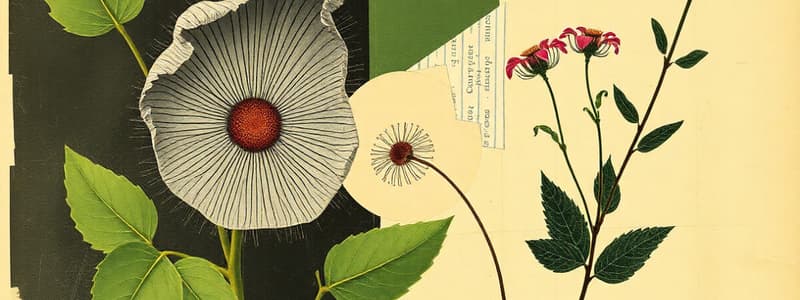Podcast
Questions and Answers
What is the primary function of xylem in vascular plants?
What is the primary function of xylem in vascular plants?
- Transport of water from roots to leaves (correct)
- Storage of photosynthetic products
- Transport of nutrients from leaves to roots
- Production of gametes
Which stage in the alternation of generations produces spores?
Which stage in the alternation of generations produces spores?
- Fertilization phase
- Meiospore phase
- Gametophyte phase
- Sporophyte phase (correct)
What are the male gametes produced in the antheridia called?
What are the male gametes produced in the antheridia called?
- Sperm cells (correct)
- Spermatophytes
- Ova
- Zygotes
What are the tightly coiled young leaves of ferns called?
What are the tightly coiled young leaves of ferns called?
Which part of the fern reproduces gametes?
Which part of the fern reproduces gametes?
What is required for the antheridium to release sperm cells?
What is required for the antheridium to release sperm cells?
What happens to a zygote after fertilization in ferns?
What happens to a zygote after fertilization in ferns?
What is the primary function of the antheridium in nonflowering plants?
What is the primary function of the antheridium in nonflowering plants?
Which of the following is a characteristic of gametophytes in nonflowering plants?
Which of the following is a characteristic of gametophytes in nonflowering plants?
Which of the following pairs of terms correctly identifies the male and female reproductive structures in nonflowering plants?
Which of the following pairs of terms correctly identifies the male and female reproductive structures in nonflowering plants?
Where can antheridia be found in the plant kingdom?
Where can antheridia be found in the plant kingdom?
What is the process of producing sperm cells in the antheridium called?
What is the process of producing sperm cells in the antheridium called?
Which of the following statements about nonvascular plants is correct?
Which of the following statements about nonvascular plants is correct?
What role does water play in the reproduction of mosses?
What role does water play in the reproduction of mosses?
What is the main difference between antheridia and archegonia?
What is the main difference between antheridia and archegonia?
Flashcards are hidden until you start studying
Study Notes
Antheridium: Structure and Function
- Male reproductive organ in many non-flowering plants (fungi, mosses, ferns).
- Sac-like structure attached to the gametophyte by a stalk.
- Produces and stores numerous sperm cells (spermatogenesis).
- One cell thick, containing cells that mature into sperm.
- Crucial for reproduction in many plant groups.
Antheridium vs. Archegonium
- Antheridium: Male gametophyte; produces sperm (male gametes).
- Archegonium: Female gametophyte; produces a single egg (female gamete).
- Both are part of the alternation of generations life cycle in many plants.
- Gametophytes are haploid (n), meaning they have half the number of chromosomes as the sporophyte.
Antheridium Location and Associated Plant Types
- Found in bryophytes (mosses, liverworts, hornworts) and cryptogams (non-flowering plants that reproduce via spores).
- Examples of plants with antheridia: mosses, ferns, algae, fungi.
- Bryophytes are non-vascular plants (lack xylem and phloem).
- Ferns are vascular plants (possess xylem and phloem); they are cryptogams and reproduce via spores. Their leaves are called fronds and young fronds are called fiddleheads.
Alternation of Generations and Antheridium Role
- Plants alternate between a gametophyte (sexual) and sporophyte (asexual) phase.
- Antheridia function in the gametophyte phase by producing sperm cells.
- Sperm are flagellated and require water to swim to the egg in the archegonium.
- Fertilization produces a diploid (2n) zygote.
- The zygote develops into a sporophyte, which produces haploid spores.
- Spores develop into gametophytes, restarting the cycle.
Fern Life Cycle Details
- Sporophyte phase: Sporangia on the underside of fronds produce spores by meiosis.
- Spores germinate (if conditions are favorable) into a gametophyte.
- Gametophyte phase: Antheridia produce sperm; archegonia produce eggs.
- Fertilization results in a zygote which develops into a sporophyte.
Studying That Suits You
Use AI to generate personalized quizzes and flashcards to suit your learning preferences.


